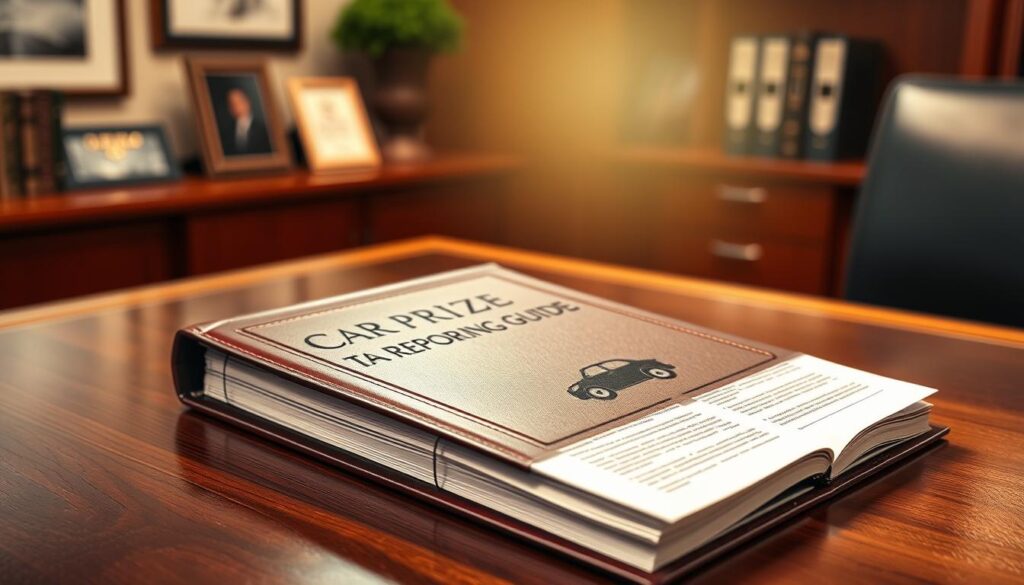Winning a new car is exciting, but the tax side can be complex. In the U.S., the IRS sees car prizes as taxable income. This means winners face a lot of tax responsibilities.
The tax on car prizes is not straightforward. The car's value is seen as taxable income. So, even if you didn't pay cash, you'll still owe taxes based on its value.
It's important to understand the tax rules for winning a car in the U.S. This helps avoid penalties and ensures you follow tax laws. Winners need to deal with both federal and state taxes on their prize.
Key Takeaways
- Car prizes are considered taxable income by the IRS
- Winners must report the fair market value of the vehicle
- Both federal and state taxes may apply to car prizes
- Proper documentation is essential for tax reporting
- Consulting a tax professional can help navigate prize taxation
Understanding the Taxable Nature of Prizes
Winning a prize is exciting, but it has tax implications. The IRS has rules for reporting car prizes. Prizes are seen as taxable income by the government.
The IRS has clear rules on taxable prizes. Any prize over $600 needs to be reported. Car prizes have complex tax rules.
What Qualifies as a Taxable Prize?
- Prizes worth $600 or more
- Non-cash prizes including vehicles
- Sweepstakes and contest winnings
- Game show and lottery prizes
How Is a Car Treated Under the Law?
Car prizes are taxed by their fair market value. You'll pay taxes on the car's full value, not what you sell it for. The IRS requires winners to report the prize as income on their tax return.
The fair market value determines your tax liability, which can be a significant financial consideration for prize winners.
Winners will get a Form 1099 showing the prize's value. Reporting car prizes on taxes means declaring the car's full value as income. This could increase your tax bracket.
The Role of the IRS in Prize Taxation
Winning a car can be thrilling, but knowing about taxes is key. The Internal Revenue Service (IRS) has a big role in prize winnings taxes. When you win a car, it's seen as income, so you must follow certain rules.
The value of the car prize matters a lot. The IRS sees car prizes as income. So, you'll report the car's full value on your taxes. You need to understand and follow specific rules for this.
Reporting Requirements for Winners
Winners should know these important reporting rules:
- Prizes over $600 get a 1099-MISC form
- You must report the car's full value as income
- Prize winnings are taxed at your regular income rate
IRS Guidelines on Taxable Income
The IRS has clear rules for prize winnings. Taxable value of car prize is the car's market value at win time. So, you'll pay taxes on the car's full value, even if you didn't pay cash.
Professional tax advisors suggest keeping detailed records of all prize winnings for accurate reporting.
To claim a car prize on your taxes, you'll report it on Form 1040 as other income. The tax details depend on your income and tax bracket. It's wise to talk to a tax expert for advice tailored to you.
Calculating the Fair Market Value of the Car
Winning a car as a prize means you need to know its taxable value. This is key for handling your income tax on car prize duties. The fair market value of your prize vehicle is important for figuring out your tax liability.

Finding the right value for a prize car takes some thought. The taxable value of a car prize isn't just its sticker price.
Key Factors Influencing Car Value
- Vehicle make and model
- Current market conditions
- Vehicle age and condition
- Mileage (if applicable)
- Optional equipment and upgrades
Reliable Resources for Value Determination
To figure out your car's value for tax, use these trusted sources:
- Kelley Blue Book - Industry-standard valuation guide
- NADA Guides - Comprehensive vehicle pricing information
- Professional automotive appraisers
- Online valuation tools from reputable automotive websites
Getting a professional appraisal is the best way to know your prize car's value. This is crucial for reporting your prize correctly and avoiding tax issues.
Remember: The IRS requires you to report the fair market value of prize vehicles as taxable income.
The Impact of State Taxes on Your Prize
Winning a car is exciting, but the tax implications can quickly become complex. Car prize and state taxes play a crucial role in determining the true value of your unexpected windfall. Every state approaches prize taxation differently, creating a landscape of varying financial responsibilities for lucky winners.
Understanding the nuanced world of tax on car prize requires careful consideration of your specific location. Some states have significantly different approaches to prize taxation that can dramatically impact your financial obligations.
State Tax Law Variations
The tax landscape for car prizes varies widely across the United States. Different states implement unique strategies for handling prize income:
- Some states tax the full value of the car prize
- Certain states offer partial exemptions for prize winnings
- A few states have more lenient taxation rules
States with Unique Tax Advantages
Residents of certain states enjoy more favorable tax treatment for prize winnings. Nine states currently do not impose a state income tax:
- Alaska
- Florida
- Nevada
- New Hampshire
- South Dakota
- Tennessee
- Texas
- Washington
- Wyoming
Tip: If you live in one of these states, you might have a more advantageous tax situation for your car prize.
Winners should always consult with a tax professional to understand their specific state tax obligations.
Additional Costs to Consider After Winning
Winning a new car is exciting. But the Tax Implications of Winning a New Car in the U.S. extend beyond the initial prize. Many winners don't realize the significant financial responsibilities that come with it.
When looking at the federal tax on car winnings, it's important to see the whole picture. The joy of a free vehicle can turn into unexpected expenses.
Sales Tax and Registration Fees
Car prizes often come with big additional costs:
- State sales tax on the vehicle's value
- Vehicle registration fees
- Title transfer expenses
- Potential local government charges
Ongoing Maintenance and Insurance Costs
Car ownership means ongoing costs:
- Annual insurance premiums
- Regular maintenance
- Fuel expenses
- Potential repair costs
Some states have unique fees. For example, electric vehicle owners might face special registration costs. It's key to consider these costs when deciding what to do with the prize.
Winning a car isn't just about the vehicle—it's about understanding the total financial investment.
Filing Your Taxes After Winning a Car
Winning a car is exciting, but it also means you have tax duties. You must follow IRS rules to report your win correctly.

Claiming a car prize on your tax return has several steps. These steps can affect how much you owe in taxes. Knowing these steps helps avoid IRS issues.
Essential Tax Forms for Prize Winners
After winning a vehicle, you need to fill out certain forms. These forms help report your prize right:
- Form 1099-MISC for prizes over $600
- Form 1040 for your yearly income tax
- State tax forms based on where you live
Reporting Deadlines and Documentation
When it comes to taxes, timing is everything. You usually need to:
- Report the car's value as income
- File your forms by April 15th
- Keep all prize documents in order
Talking to a tax expert can help you report correctly and avoid tax problems.
The value of your car prize will increase your income. Planning carefully and reporting accurately is key to handling your taxes well.
Strategies to Minimize Your Tax Liability
Winning a car prize can lead to unexpected tax challenges. Winners can use several strategies to handle their tax obligations well.
Smart tax planning can lessen the financial impact of a car prize. Winners have many options to reduce their tax responsibilities.
Charitable Donation Strategies
Donating to charity is a strong way to lower taxes. Car prize winners can try these methods:
- Donate the vehicle to a qualified charitable organization
- Claim a tax deduction based on the car's fair market value
- Get an official receipt for tax documentation
Gift Tax Considerations
When giving the prize car to someone else, knowing about gift tax is key. The IRS lets people give a certain amount each year without tax:
- Current annual gift tax exclusion limit
- Potential tax implications for higher-value gifts
- Documentation needs for gift transfers
Getting advice from a tax expert is the best way to deal with prize winnings tax. Every person's tax situation is different. Personal advice can lead to big tax savings.
Professional tax advice can help you manage your car prize tax duties while following IRS rules.
Common Misconceptions About Prize Taxes
Winning a car can be thrilling, but many are confused about taxes on prizes. It's key to know the IRS rules for car prize winnings to avoid surprises.
Understanding tax on car prizes can be tricky. Not all prizes are taxed the same. Many people have wrong ideas about prize taxes.
Debunking Prize Tax Myths
- The $600 Threshold: Most car prizes are taxable. The IRS wants you to report prizes worth $600 or more.
- Not All Prizes Are Tax-Free: Even small prizes might be taxed.
- Complete Prize Package Taxation: Each part of a prize can be taxed differently.
When Are Car Giveaways Taxable?
The tax on winning a car depends on several things. IRS rules for car prize winnings look at:
- The fair market value of the vehicle
- How you got the car (contest, raffle, game show)
- The total prize value
Winning a car isn't always a clear win. The tax side can change how much you really get.
Potential winners should think about the prize's total cost. This includes any taxes. Sometimes, it's better to pass on the prize.
Conclusion: Navigating Your New Tax Responsibilities
Winning a new car in the United States comes with big tax implications. The federal tax on car winnings is a key financial factor to consider. It's important to plan and make smart decisions to handle these taxes.
Understanding the tax rules is crucial when you win a car. You need to think about federal and state taxes, the car's value, and extra costs. The taxes on a new car can add up quickly, affecting your finances by thousands of dollars.
Final Assessment of Prize Ownership
It's important to plan ahead for taxes when you win a car. Keep records of your prize, get a professional to value it, and know what taxes you need to report. Talking to a tax expert can help you save on taxes and follow IRS rules.
Professional Guidance Recommendations
Every car prize has its own tax issues. Getting advice from a tax expert who knows about prize income is very helpful. They can guide you through the federal tax on car winnings, protecting your money and making sure you report taxes correctly.
